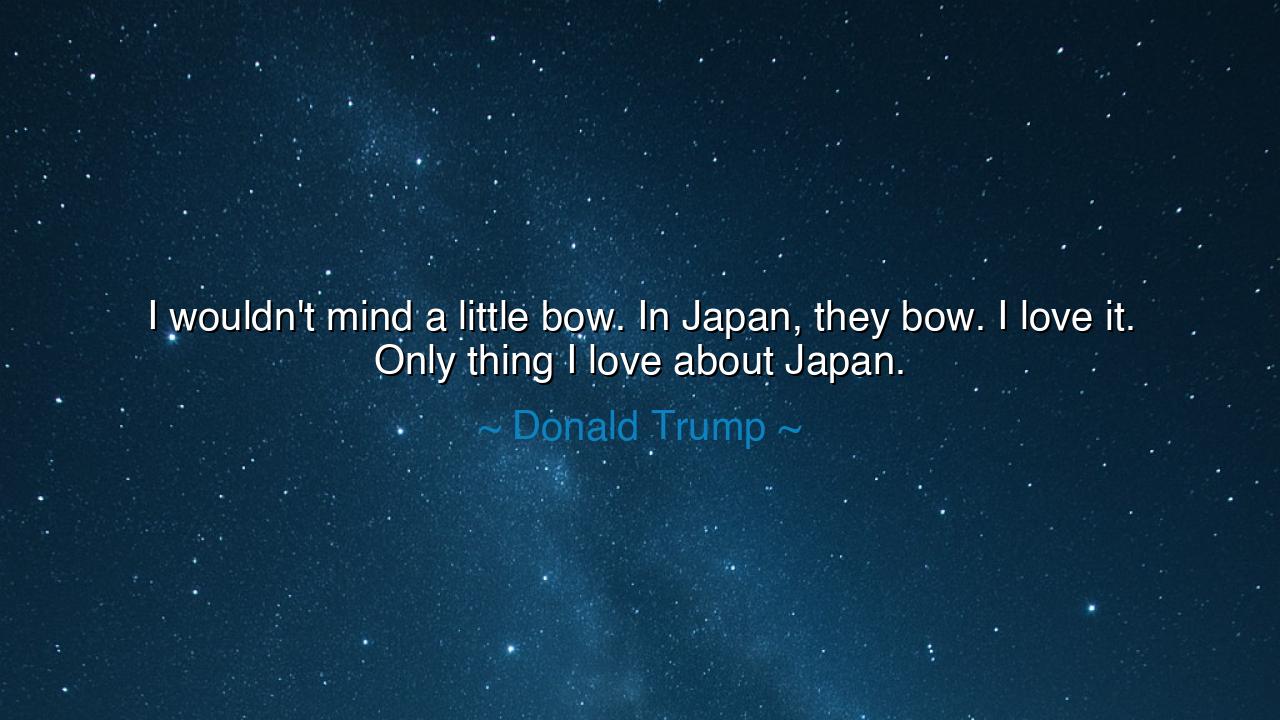
I wouldn't mind a little bow. In Japan, they bow. I love it. Only
I wouldn't mind a little bow. In Japan, they bow. I love it. Only thing I love about Japan.






"I wouldn’t mind a little bow. In Japan, they bow. I love it. Only thing I love about Japan." — thus spoke Donald Trump, a figure both praised and condemned, yet always unafraid to reveal the desires that dwell in the human heart. At first glance, these words may seem light, even boastful — but beneath them lies a deeper reflection on respect, honor, and the eternal human hunger for recognition. In this brief remark, we glimpse a truth as old as kingship itself: that man, in every age, seeks acknowledgment, and that the simplest gesture — a bow — can carry the weight of an entire philosophy of reverence.
In Japan, the bow is not a mere motion of the body, but a symbol of the soul. It is humility made visible, a quiet acknowledgment of another’s presence and worth. When a Japanese man bows, he lowers himself not in weakness but in strength — declaring, “I see you, and I honor what is divine in you.” This ancient custom, shaped over centuries, expresses what many civilizations have forgotten: that respect is not submission, but harmony. When Trump says he loves this act, he speaks — knowingly or not — to that universal longing within every human being to live in a world where respect is not demanded by force, but offered freely as a sign of mutual recognition.
The origin of this quote rests in Trump’s lifelong fascination with power and the symbols that surround it. His words reveal not only a yearning for authority but also a subtle admiration for cultures that understand the sacred dance of honor. To bow is to engage in this dance — a choreography of humility and pride, of giving and receiving dignity. In admiring Japan’s tradition, Trump unconsciously acknowledges a truth the ancients knew well: that the truest power is that which is recognized by others, not seized.
Consider the story of the Emperor Ashoka of India, once a conqueror who subdued lands with the sword. After beholding the suffering he caused, Ashoka renounced violence and ruled instead through compassion and respect. He did not demand that his people bow before him — they bowed willingly, moved by the goodness that radiated from his heart. His reign, remembered as one of peace and enlightenment, reminds us that respect, whether given or received, becomes holy when it is born of love and not fear. Thus, even the smallest gesture — a bow, a word of gratitude, a moment of stillness — can bind ruler and subject, friend and stranger, in sacred unity.
Trump’s remark also reflects a paradox that touches all human life. For though he is a man known for commanding attention, he also expresses, perhaps without realizing it, a yearning for sincerity. The bow, unlike applause or praise, cannot be faked; it requires presence, mindfulness, and acknowledgment. To bow is to say, “I see you,” and to be bowed to is to be truly seen. In a world intoxicated by noise and pride, this simple act stands as a reminder of what humanity has lost — and what it still secretly craves.
There is also a lesson here for those who lead, whether kingdoms or households. Power without humility breeds isolation. But the leader who values respect, who seeks connection through small gestures of mutual honor, becomes beloved rather than feared. Trump’s fascination with the bow may reveal that, even among the proud, there remains a flicker of longing for reverence — not empty obedience, but the kind that springs from admiration freely given. The ancients would have said: He who bows first wins the truer victory.
So, let this be the teaching drawn from these curious words: Learn to give and to receive honor. Do not demand reverence, but live in such a way that it is offered naturally. Lower yourself in humility, not to diminish your worth, but to elevate the worth of others. When you recognize the divine spark in another, you kindle your own. The bow of Japan teaches us that grace is strength restrained, and that the soul grows most powerful when it bends before truth.
Thus, the quote of Donald Trump, though born from jest, holds an ancient echo: the echo of civilizations that knew how to greet the world with reverence. If we could learn once more to bow — not in servitude, but in respect, not in fear, but in understanding — then perhaps our divided world would remember its unity. For in the act of bowing, we say without words what all wisdom teaches: I see you, I honor you, and in that moment, we are one.






AAdministratorAdministrator
Welcome, honored guests. Please leave a comment, we will respond soon